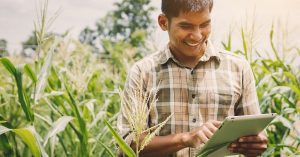The impact-focused Us-based nonprofit startup accelerator, Food System 6 (FS6), announced the eight early-stage companies from around the world selected to participate in their new Circular Economy program, launched in partnership with global sustainable packaging solutions leader Huhtamaki. The purpose of the Huhtamaki Circular Economy Start-up Program by Food System 6 (FS6) is to accelerate the development of young and promising companies working to deliver innovative sustainable solutions in areas such as waste management, sustainable packaging alternatives, new materials innovation, and regenerative production models.
Food System 6 (FS6) is a non-profit based in the San Francisco Bay Area whose mission is to support impact-driven entrepreneurs as they transform how we grow, produce, and distribute food. The organization runs a comprehensive accelerator program that mentors entrepreneurs by coaching them through a wide range of business and organizational needs. FS6 also works to educate stakeholders on the unique capital needs as related to redefining the food system.
“We are thrilled to have the opportunity to work with these entrepreneurs leading change in the world,” said Caesaré Assad, chief executive officer of Food System 6. “They are helping to solve some of the most urgent issues within circularity in our world today—from materials innovation to waste management solutions and community resiliency projects. These leaders are showcasing the depth and breadth of a systems-driven circular economy.”

Through the partnership with Huhtamaki, FS6 is committing critical mentorship, advising, and networking resources to provide direct support and help the selected participants build their efforts to scale. The eight cohort members were selected for their unique and timely innovations across the impact areas of circularity, healthy people, vibrant farms, sustainable ecosystems, and justice and fairness.
The cohort includes the following eight innovations
Aheza Iwacu – Transforming household waste into a valuable resource through the collection, composting, upcycling, and education in Burundi.
Andes – Harnessing microbes’ power to increase the crop yield, nitrogen capture, and carbon sequestration of plants.
Cooperative Food Empowerment Directive (CoFED) – Reenvision and rebuild food and land cooperative ecosystems through the transformational leadership of QTBIPOC young folx.
Matriark Foods – Upcycling vegetable surplus to feed people and protect nature.
mobius – Converting organic waste into renewable chemicals and biodegradable materials.
Nafici Group – EcoPulping turns agricultural waste into raw material for low-carbon, non-plastic packaging, and paper.
Rhizoform – Harnessing fungi’s power to “grow” a bio-based alternative to plastic thermal food coolers, foodservice packaging, and more.
SoluBlue – Creating biodegradable seaweed-based packaging that extends shelf-life of fresh food and reduces plastic waste.
“In addition to adopting identified solutions more widely, we need to invest in developing the next generation of initiatives to tackle challenges and build a circular economy that takes us to the future,” says Charles Héaulmé, President and chief executive officer of Huhtamaki. “Through the Huhtamaki Circular Economy Start-up Program and our partnership with Food System 6 we can help discover, develop and deliver such innovative solutions. I am excited to learn more about the eight finalists and I am proud that Huhtamaki can play a part in speeding up the commercialization of their innovative solutions.”
According to the press statement, this cohort of emerging leaders will receive mentorship, advising, and up to US$ 300,000 in equity-free grants to accelerate their implementation of sustainable and regenerative solutions. The program will host interactive online sessions with participants from October through November 2020, culminating with a week of immersive virtual programming.
IndiFoodBev — authentic, impactful and influential
An English-language food and beverage processing and packaging industry B2B platform in print and web, IndiFoodBev is in its third year of publication. It is said that the Indian food and beverage industries represent approximately US$ 900 billion in revenues which implies more than 20% of the country’s GDP. Eliminating the wastage on the farmside can help to deliver more protein to a higher number of the population apart from generating sizable exports. The savings in soil, seeds, water, fertilizer, energy and ultimately food and nutrition could be the most immense contribution that country is poised to make to the moderation of climate change.
To improve your marketing and grow sales to the food and beverage processing and packaging industry, talk to us. Our research and consulting company IppStar [www.ippstar.org] can assess your potential and addressable markets in light of the competition. We can discuss marketing, communication, and sales strategies for market entry and growth.
Suppliers and service providers with a strategy and budget for targeted marketing can discuss using our hybrid print, web, video, and social media channels to create brand recognition linked to market relevance. Our technical writers are ready to meet you and your customers for content.
The second largest producer of fruit and vegetables in the world is continuously expanding processing capacities and delivery systems with appropriate innovative technologies. We cover product and consumer trends, nutrition, processing, research, equipment and packaging from farm to thali. Get our 2025 media kit and recalibrate your role in this dynamic market. Enhance your visibility and relevance to existing markets and turn potential customers into conversations. Ask for a sample copy of our bi-monthly in print or our weekly IndiFoodBev eZine each Wednesday.
For editorial info@ippgroup.in — for advertisement ads1@ippgroup.in and for subscriptions subscription@ippgroup.in
Naresh Khanna – 10 February 2025
Subscribe Now











